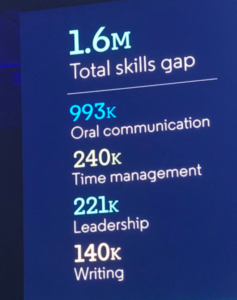A recent article in The Atlantic brought up is seemingly troubling subject. Teens are voicing their opinion that being forced to speak up in classes is discriminatory:
“in the past few years, students have started calling out in-class presentations as discriminatory to those with anxiety, demanding that teachers offer alternative options. This week, a tweet posted by a 15-year-old high-school student declaring “Stop forcing students to present in front of the class and give them a choice not to” garnered more than 130,000 retweets and nearly half a million likes. A similar sentiment tweeted in January also racked up thousands of likes and retweets. And teachers are listening.”
Hmmm. I’ve got some thoughts…
I was out at LinkedIn’s Talent Connect recruiting conference this past week. Great content, engaged recruiting pros and leaders, and a lot of great data being shared. One of those data points shared by CEO Jeff Weiner was the largest skills gap currently in need by employers. Can you guess which skill was most needed?
- Tech/IT/coding-type of skills? No, but not a bad guess!
- Healthcare/Nursing skills? No, but another great guess!
The #1 most sought after skill by employers is Oral Communication!
Turns out that we have a ton of kids coming into the workforce that have a hard time communicating orally! Hmmm…
Yeah, so we should probably not make kids who have anxiety over public speaking not speak in the safe environment of a classroom in front of a trained educator!
You know what, most people have anxiety about public speaking. The answer isn’t let’s try and find ways for these kids not to speak, its let’s find ways to get these kids to begin speaking in small ways where they start to gain confidence and little by little start ramping up how and where they speak.
Education isn’t about making some comfortable. It’s about making you uncomfortable in a safe way. If we know kids need oral communication skills to be successful in the work world, we must demand that our educators help make this happen.
I get we are in a time where kids have a great platform to voice their opinions and desires. Good for them! It’s awesome time to be alive. Also, these are kids. Kids can be super smart, and super short sited. It’s our job as adults to say, “I hear you! Public speaking in front of your peers is hard. That’s why you actually need to do it more, not less.”
So, knowing this is a skill that most adults also struggle with, what do you think? Should we be finding alternatives for kids who don’t want to speak in front of their class, or should we make them stand up and speak?
I’m all for making them uncomfortable and teaching them a skill that will help them the rest of their life. I don’t need them to get on stage and speak in front of an audience, but I do need them to be in a meeting with ten co-workers and be willing and active in that conversation!


Somehow I mostly got out of public speaking in high school and college. By the time I was in my 20s, I couldn’t speak in front of a room of 10 people. I hated this fear and worked hard to overcome it. I am convinced that it wouldn’t have been so difficult if I had been forced to learn some key presentation skills earlier.
My kids are also introverts and therefore I’ve made a concerted effort to get them speaking in front of groups, in a way that works for them. (Scouts, Model UN, etc.) They are already far ahead of where I was at their age.
Further limiting public speaking opportunities for youth is a terrible idea, no matter how much I would have supported it when I was in high school.
Great article, Tim. I have a 19-yo son who went to a terrific elementary and middle school that required public speaking from kindergarten on. He’s AMAZING at presenting – even though he’s an introvert. It took me until my 40’s to be able to even somewhat effectively speak in public. I would love to see schools take the lead and get kids to learn to do more of this, not less, and get comfortable with being uncomfortable.
I’m not surprised that oral communication ranked highest for skills gap. I was a theatre nerd growing up, so while performing or presenting is still stressful, it’s something I’ve had a lot of practice with over the years. This willingness to get uncomfortable and express my views or make an argument in front of a group has definitely led to professional opportunities I wouldn’t have otherwise enjoyed. Heck, a job interview is a very stressful and nerve-racking experience where you need to perform under pressure and make valid points on the fly. If we teach children that that discomfort can easily be avoided, we’re really hurting them (and the workforce) long-term when they realize that, just like lots of things in childhood, life just doesn’t work that way.
I agree so completely. Public speaking and presentation skills are vital to success in the real world. Period. Everyone is nervous about getting in front of a group at one time, but getting better over time is what it’s all about.
Here’s a commercial for something I feel quite strongly about- speech and debate in high school.
My two sons have participated in both events for several years- one in speech and one in debate.
Both have become very good on their feet and have no issues with making their points to others. If you couple those skills with analytics, discipline and curiosity, there is nowhere they can’t go in their respective careers. If your children’s schools have a speech and debate team, get your kids to sign up. My wife and I are debate judges. What I’ve learned is immense from both listening to what they are saying but how much they are growing as people and as debaters. Often they start off as tentative teenagers, with ‘like’ and ‘you know’ as part of their presentation and once they receive feedback over time, they improve dramatically!
Tim, you hit a hot button here. Great posting.
I’m in disbelief that a student anywhere hasn’t been required to speak in front of their class before they reach their teen years. If this is the case, then they are not being adequately prepared for high school, let alone the workplace. This is a vital skill that can be taught starting at a very early age (my kids all have participated in “Show and Tell” in pre-school and kindergarten). Perhaps they should be doing much more of it to become comfortable, rather than lobbying to do less? Having strong oral communication skills can be a deciding factor as to whether or not one is selected for a position or promotion. Just as in the example given earlier in the comments, it is required for far more career disciplines than not.
I agree with you Tim. Communication can solve many issues. Social media is not always the solution to speaking out. Classroom activities involving public speaking only going to improve how we all communicate. I remember my first presentation in college. Yeah, I was nervous but remember my professor and peers clapping and asking questions later on the topic. After that it was all so much easier.
I handle recruiting for my company and truly notice it is so hard to have the general labor candidates interact even on the phone.
As a recruiter and former English teacher, I can tell you that learning oral communication skills is a critical factor in success, regardless of the field you choose. A plumber – who is worth his weight in gold — told me awhile back that he took a correspondence course in grammar and oral communication to be able to talk to his clients in simple, clear language about what their problem is and how he is going to fix it. Teachers’ responsibility is to provide the resource for students with all learning styles to learn better communication skills. The students’ responsibility is to take advantage of those resources.